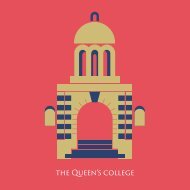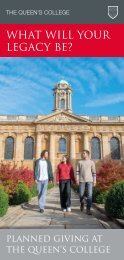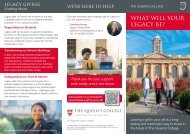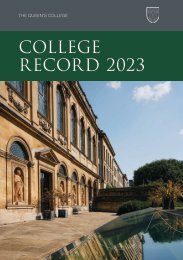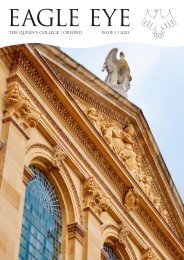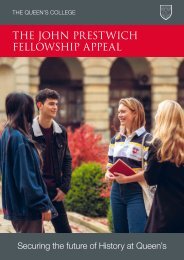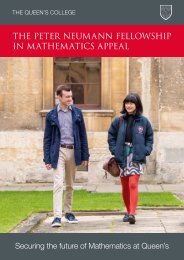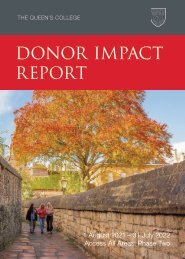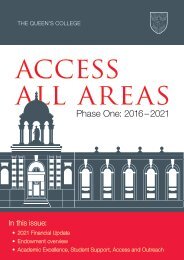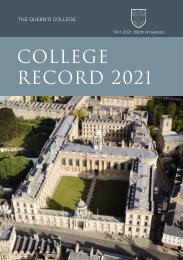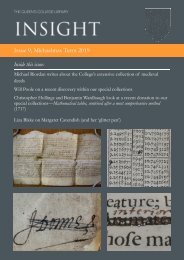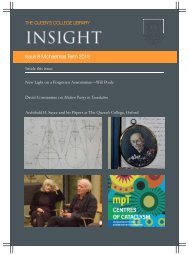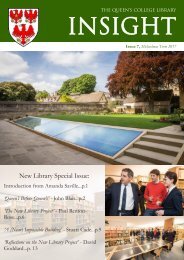The College Record 2022
You also want an ePaper? Increase the reach of your titles
YUMPU automatically turns print PDFs into web optimized ePapers that Google loves.
Reports and <strong>College</strong> Activities<br />
We had held a small in-person workshop in Michaelmas Term – on the German<br />
poet Nora Gomringer, with her translator Annie Rutherford – but this Ethiopian event<br />
was our first major live event since the pandemic began, and the buzz in the room<br />
throughout the performance and drinks reception proved that a return to the stage<br />
was the right decision.<br />
We preceded this performance with a translation workshop, too, where university<br />
students worked together with poets, professional translators, Oxford residents and<br />
members of the Ethiopian diaspora. <strong>The</strong> power of translation came to the fore when<br />
one participant, who had travelled over eighty miles to attend, gave the caveat<br />
that she was “not a poet” before reading out her translation of the short poem –<br />
we should manage our expectations, in other words. She went on to read out a<br />
moving, powerful, creative rendering of the original. Translation makes writers of<br />
those who would not otherwise write, and this is what we see time and again in our<br />
schools’ workshops.<br />
<strong>The</strong>se workshops, by the student Creative Translation Ambassadors that we train<br />
every autumn, were back in the classroom for the first time since 2019. Selected<br />
from Oxford’s undergraduate and postgraduate community, 18 Ambassadors codesigned<br />
and -delivered workshops in six languages in eight local state schools.<br />
We also began to collate the data from our research project on the impact of these<br />
workshops, which show that even these relatively short interventions can transform<br />
a pupil’s view of language-learning: from ‘boring’ to ‘interesting’, from ‘difficult’ to<br />
‘enjoyable’ and ‘creative’.<br />
My favourite response of all came from a teacher in Lancashire, who reported that,<br />
during a Year 8 Spanish lesson using our teaching resources, a 13-year-old student<br />
had remarked, “This feels important”. That particular lesson involved translating a<br />
prose extract about migration within South America: our resources routinely bring<br />
matters of historical, social or political import into the classroom through literature<br />
in this way, as well as foregrounding youth culture, street art, instapoetry and more.<br />
<strong>The</strong> language-learning experience needs to reflect the pupils’ interests – the things<br />
that are “important” to them – even while their language skills may be relatively limited.<br />
And our work with creative translation shows that we don’t need to wait until A Level/<br />
Highers to introduce authentic, engaging, inclusive culture into the curriculum.<br />
Inclusion has been central to our work on the Anthea Bell Prize this year, through<br />
our project on ‘Inclusive Outreach through Translation’ with the MML Faculty and<br />
several other partners. With support from Oxford Humanities ‘Culture Change Fund’,<br />
we established a new collaboration with the Institut français and Goethe-Institut in<br />
London, to develop, test and publish authentic creative translation resources that<br />
explore equality. <strong>The</strong>se will be tested in schools in autumn <strong>2022</strong>, and soon after<br />
made available to the 1000+ Modern Languages teachers who have registered to<br />
receive our resources and lesson plans.<br />
54 <strong>The</strong> Queen’s <strong>College</strong> | <strong>College</strong> <strong>Record</strong> <strong>2022</strong>




